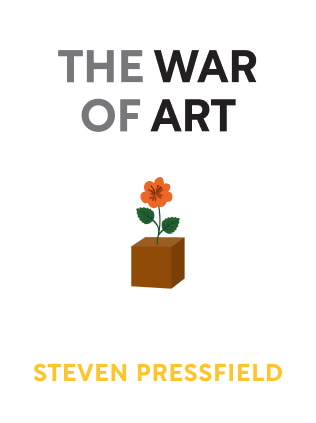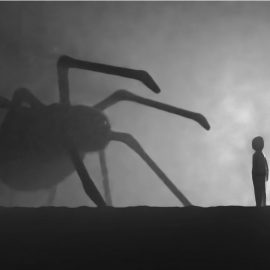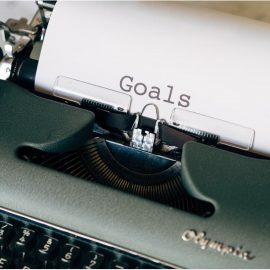

This article is an excerpt from the Shortform book guide to "The War of Art" by Steven Pressfield. Shortform has the world's best summaries and analyses of books you should be reading.
Like this article? Sign up for a free trial here .
Are you looking for quotes from The War of Art? What are some of the best passages of the book that are worth knowing?
In The War of Art, Steven Pressfield writes about the common obstacles faced by creative people. Whether you’re an artist, writer, or entrepreneur, this book will help you get on track with your creative ambitions. Understanding the key passages from the book will help you grasp the main concepts of the book and apply the lessons to your own life.
Keep reading for the best quotes from The War of Art, with explanations.
The War of Art: Quotes With Explanations
The following The War of Art quotes will help you to better understand the book and apply the key concepts to your own creative projects:
“We must do our work for its own sake, not for fortune or attention or applause.”
When you look outward instead of inward, you stop doing the work for the sake of the work. You approach every connection through the lens of how it can enhance your position. And worst of all, you become a hack.
A hack is someone who shapes their art to improve their ranking within the hierarchy. You write, paint, or develop your ideas based on what you believe people want to see and will accept. You become afraid of creating what is in your heart because you fear it won’t be received well. You force yourself to travel down an unauthentic path, and you and the work suffer.
You might achieve financial success as a hack because American culture loves a good panderer. But you’ll have sacrificed your muse and not fulfilled your calling. Therefore, the success will only be external and the work less than what you’re capable of.
“The most important thing about art is to work. Nothing else matters except sitting down every day and trying.”
The only thing you have to do to win the battle against resistance is do the work. The work is where your creative power lives. You fall into a timeless space where the rest of the world drops away. You are alone on your creative island, and only you have access to this part of yourself. The person you show the world is not the person working with your internal genius.
To reach this creative space, you must be a professional in your work, not an amateur. When you’re an amateur, you dabble in your art whenever inspiration strikes or you’re in the right mood. You’re not committed to your art, and your goals center around fun, money, and status. Resistance loves an amateur because you are easily distracted from the work.
When you’re a professional, you create art because your soul demands it. Your art is a full-time commitment, even if you aren’t getting paid. You sit down to face your art daily because it is part of who you are. You shape your life to include the work as a priority. Resistance hates the professional because you are less likely to cower to fear.
“The artist committing himself to his calling has volunteered for hell, whether he knows it or not. He will be dining for the duration on a diet of isolation, rejection, self-doubt, despair, ridicule, contempt, and humiliation.”
When you’re a professional artist, you live in a world fraught with resistance. Fear, doubt, passion, vulnerability, and struggle are present every day of your life. These feelings make you miserable, which resistance is counting on. If you feel miserable, you won’t want to dwell in that world for very long. You’ll search for ways to self-soothe or get instant gratification. But a professional understands that his world is a living hell and accepts it as part of life.
“Of any activity you do, ask yourself: If I were the last person on earth, would I still do it?”
A true artist does the work for the sake of the work. From this vantage, you also harness the energies of your higher consciousness. If you do the work for some external reward or recognition, you’re working toward a hierarchical goal. You are presuming to know more than your muse and higher mind because you think you can manipulate the work for profit. This presumption is an affront because you’re allowing your Ego to infiltrate their territory. As a result, you will receive no guidance.
“The most pernicious aspect of procrastination is that it can become a habit. We don’t just put off our lives today; we put them off till our deathbed.”
Procrastinating one day is normal. Procrastinating day after day is a habit. That habit can become a personal character flaw if you let it. You have the power every day to stop resistance in its tracks. All you have to do is take the first step toward achieving your goal. If you put that first step off again and again, you have made procrastination a lifestyle and resistance your best friend.
“The artist cannot look to others to validate his efforts or his calling. If you don’t believe me, ask Van Gogh, who produced masterpiece after masterpiece and never found a buyer in his whole life.”
Hierarchy is death for the artist. It narrows your scope regarding the work. You strive to find your place within your field, so you measure yourself against those achieving success. You also cut yourself off from those below you. Your worth becomes entwined with where you land within that group of artists. You lose the ability to see the larger tribe and make positive connections. You try to shape yourself according to the rank you wish to become.
When you look to the outside world to define your worth, you will never be content. Look at Vincent Van Gogh. He was fully engaged with his Self and pursued his calling as a professional. But the world didn’t recognize his art as worthy, and he suffered psychologically.
“Most of us have two lives. The life we live, and the unlived life within us. Between the two stands Resistance.”
We all have a part of ourselves that is unrealized—a dream or calling that encompasses our true selves. But many of us struggle to live those authentic lives. What stops us is something called resistance. Resistance is the enemy of achievement. Artists who don’t create art, innovators who don’t innovate, and healthy people who live unhealthy lives are all losing their battles with resistance.
Resistance is a toxic force and the cause of many negative psychological issues. When you lose the battle with resistance, you likely experience some form of depression, discontent, and unhappiness as a result.
“Procrastination is the most common manifestation of Resistance because it’s the easiest to rationalize. We don’t tell ourselves, “I’m never going to write my symphony.” Instead we say, “I am going to write my symphony; I’m just going to start tomorrow.”
The most common form resistance takes is procrastination. You want to achieve your dreams, but you put off starting. For example, you want to write a book, and you intend to write it. But instead of starting to write your book, you put it off until tomorrow. You rationalize this decision as a lack of energy or time. Really, it’s resistance manipulating your motivation.
“If you find yourself criticizing other people, you’re probably doing it out of Resistance. When we see others beginning to live their authentic selves, it drives us crazy if we have not lived out our own.”
When you criticize others, it’s a good indication that resistance is strong in your life. You may feel envious of people who are living their dreams and attempt to tear them down. This behavior only masks how scared you are to begin your own journey. Resistance is a personal sensation, but it can cause you to harm other people. Be careful of moments when you feel the need to criticize others. Likely, the problem is with you, not them.
If you are working within the power of your true spirit, you have no reason to feel threatened or offended by another’s success. You understand how hard it is to push past resistance and follow your dreams, so you provide encouragement, not criticism.
“It’s better to be in the arena, getting stomped by the bull, than to be up in the stands or out in the parking lot.”
If this life sounds unpleasant, it’s because it is. When you commit to following your true spirit, every ounce of resistance will place roadblocks in your path that you must overcome. There is no getting around it. You have volunteered to be miserable, and you must learn to love it.
Learning how to be miserable is essential for any artist. You will have to give up things in your public life so you can be present in your artistic life. You have to come to the battle every day knowing you will be tired and possibly injured from doubt, humiliation, and rejection on a regular basis. But you can wear your scars like a badge of honor, because at least you were in the battle and fought. You are a soldier in the war to fulfill your artistic calling. You win the war every time you show up to the front line.
The above quotes from The War of Art will help you overcome resistance and achieve success in your chosen field.

———End of Preview———
Like what you just read? Read the rest of the world's best book summary and analysis of Steven Pressfield's "The War of Art" at Shortform .
Here's what you'll find in our full The War of Art summary :
- Why creative people feel resistance when approaching their true work
- How to break down the wall that holds you back from reaching your potential
- How to tap into your creative power and honor the genius you were born with






